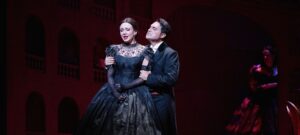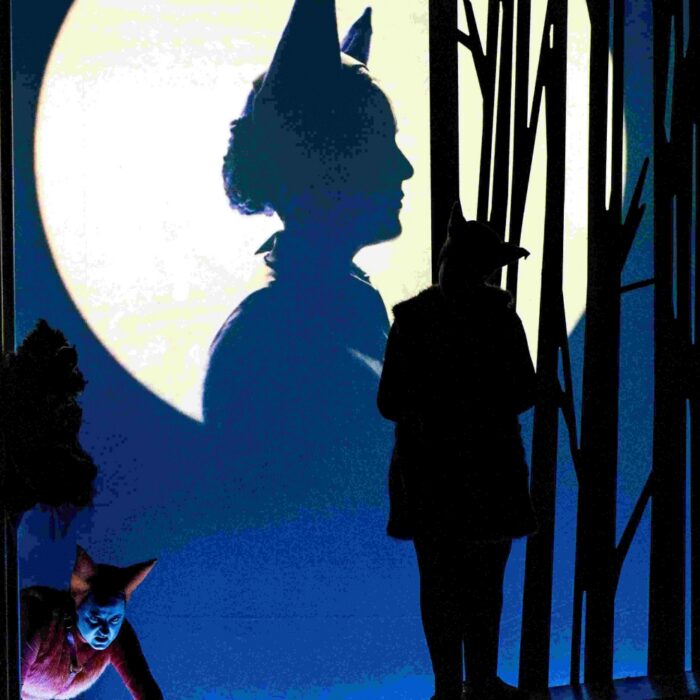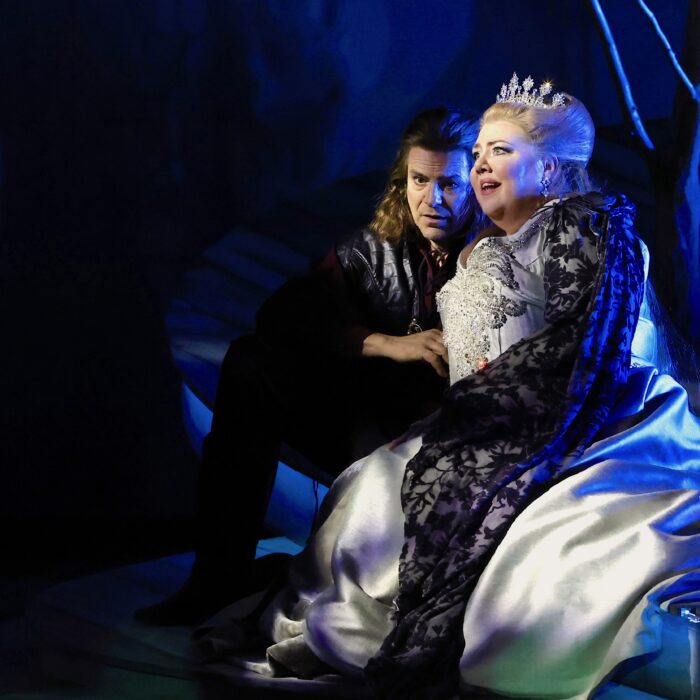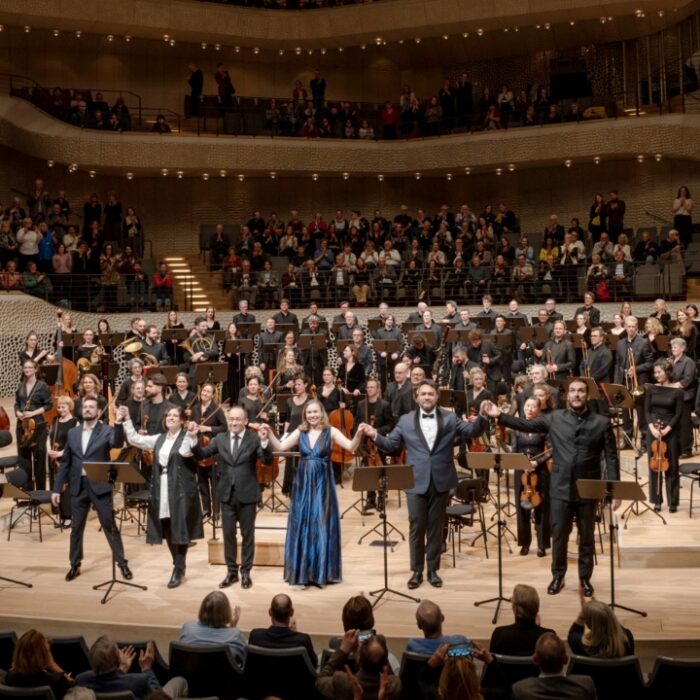
Royal Opera House 2024-25 Review: La Traviata
By Mike Hardy
When I asked soprano Aida Garifullina, in an earlier interview, what dream role she aspired to sing, she responded: “To be honest, I’m singing it at the moment…‘Traviata’ is my favorite opera.” And, on the opening day of this performance, almost 30 years since Richard Eyre’s celebrated first production of it, she sang her heart and soul out to prove it.
This is a classic, traditional staging of one of opera’s most revered and performed roles, with period settings in rich, Regency reds and golds with ornate gowns and attire, all wonderful belle époque flair, courtesy of designer Bob Crowley.
Absent too, was the hedonism, decadence and salaciousness that would unquestionably have been central to the real life of Marie Duplessis, ‘The Lady of the Camellias’ on whom Verdi based his work. Instead, we are presented with a respectable, almost saintly tale of indulgence, jealousy, love and ultimately, heartbreak.
And that is befitting for Verdi’s most provocative, perhaps most exquisitely scored work which is an almost endless sequence of memorable arias and duets.
Of course, I always subscribe to the notion that there are, invariably, opening night nerves and hiccups, and it would be fair to say that the performance started cautiously, with voices seeking to establish an even keel. By the time the ensemble got to sing the renowned drinking song, the Brindisi (“Libiamo ne’lieti calici”) however, artistes’ adrenaline was settling and focus, and true splendour ensued.
Alfredo, the lovelorn bourgeois romantic is played here by Italian tenor Francesco Demuro. His is a warm, expressive, mellow tenor voice. His ‘Un dì, felice, eterea’ duet in the first act was proficient. His second act aria ‘De’ miei bollenti spiriti’, alas, lacked impact and I found his top register throughout much of the evening to be somewhat insubstantial. Further, his pianissimos in the earlier scenes failed to carry. However, he rallied appreciably in the final act where he delivered an impassioned duet, ‘Parigi, o cara’, sung with much beauty and sentiment. Frequently petulant, his character was all the more convincing for it and his final scenes were made all the more potent because of it. Vocally inconsistent at times, his acting was none-the-less superb and wholly engaging.
Alfredo’s father, Giorgio Germont, was sung by Romanian George Petean who presented a warm, rich, emotional laden baritone. His entreaties to Violetta in the second act were suitably cold and perfunctory, but his voice adopted a wonderful softness and legato when pleading with, and trying to appease, his son. His disappointment when Alfredo rebuked Violetta, throwing his casino chips in her face and causing her to collapse in humiliation, was truly tangible, where he sings the line ‘Dov’è mio figlio? Più non lo vedo: in te più Alfredo trovar non so.’ Moreover, his singing and performance in the final act where he comes to fulfill his promise to “embrace Violetta as a daughter”, is wholly heart-rending. Surprisingly, he took a high B flat at the end of Act two, and di so with some finesse. A heroic accomplishment indeed.
Other notable plaudits must go to mezzo soprano Jingwen Cai who was vocally impressive as socialite and friend to Violetta, Flora Bervoix in the second act, second scene party. Her fine, polished mezzo left me wanting to hear more.
Fellow Jette Parker colleague Veena Akama-Makia was adroit as Violetta’s maid and companion, Annina, where she portrayed a compassionate care provider and ally. She possesses a sweet mezzo voice of clarity and presented a credible, suitably stoic character.
Bass Barnaby Rea plays Doctor Grenvil, effecting his role with a treacle-rich, cultured voice of some quality. His final act presence and performance proving integral to the overall emotional roller-coaster.
But, as the title tells us, “Traviata” is all about the “fallen woman” Violetta Valéry. I would venture that it is a difficult soprano role to accomplish, not just vocally with its arduous coloratura trills and energetic runs, but to employ, incorporate and maintain such dramatic intensity, and to do so convincingly, is a big ask. That Garifullina does that, and MORE, is testament to her remarkable gifts and is validatory of her assertions that the role is her favorite. Along with her fellow cast, she seemed slow to start, but quickly became emboldened in her duet and interactions with Alfredo, before soon firing on all cylinders by the time she sings her ‘Ah, fors’ è lui’ with exquisite floating nuances, and her vibrant ‘Sempre Libera’, which commanded a curtain call at the cessation of Act one.
She reserves her full majesty, however, for the final act where her heart-wrenching ‘Addio del passato’ demonstrated her wonderful control and colour. Her final ‘Parigi, o cara’ duet with Alfredo was sublime, (not least also because of the tenors input here), and at the risk of sounding glib, her final scenes had me crying worse than Julia Roberts in ‘Pretty Woman’. I defy anyone to watch her final moments in the opera and be less unmoved.
The sumptuousness of the sets I have already alluded to, but it has to be said that the emotional potency and occasional ethereal ambiance was as a result of some clever lighting, courtesy of Jean Kalman who employed some effective key, fill and back-lights, together with some contracting isolation spotlighting which served to illustrate and bring in to sharp focus, key moments.
The Royal Opera House chorus were, as they always are, remarkably splendid and their contribution to these great works can never be overlooked or underestimated. The second act also saw some wonderful ‘gypsy’ dancing, along with table-top ‘matador’ dancers who performed with great athleticism, making the act a visually spectacular affair.
The Royal Opera House Orchestra performed with their usual aplomb, especially when creating some most evocative and affecting strings. However, to my ear, in the early stages, I felt they were at times a tad brash and overpowering, and a touch too pacy under the baton of conductor Alexander Joel who otherwise soon settled into measured and confident control.



